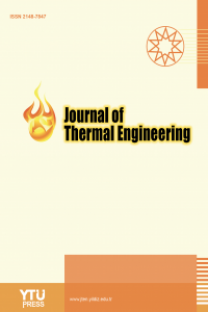COMBUSTION ANALYSIS OF CI ENGINE FUELLED WITH ALGAE BIOFUEL BLENDS
Algae Biofuel, Performance Combustion, Emission,
___
- [1] Demirbas A. (2010). Use of algae as biofuel sources. Energy conversion and management, 51, 2738-2749.
- [2] Kleinova A et al,. (2012). Biofuels from algae. Procedia Engineering, 42, 231 – 238.
- [3] Singh J and Gu S. (2010). Commercialization potential of microalgae for biofuels production. Renewable and sustainable energy reviews, 14, 2596-2610.
- [4] Schlagermann P. (2012). Composition of algal oil and its potential as biofuel. Journal of combustion, 2012, 1-14.
- [5] Islam M A Rahman M M Heimann K and Ristovski Z D. (2015). Combustion analysis of microalgae methyl ester in a common rail direct injection diesel engine. Fuel, 143, 351-360.
- [6] Saravanan S Nagarajan G Lakshmi Narayana Rao G and Sampath S. (2010). Combustion characteristics of a stationary diesel engine fuelled with a blend of crude rice bran oil methyl ester and diesel. Energy, 35, 94-100.
- [7] An H W M Yang S K Chou and K J Chua. (2012). Combustion and emissions characteristics of diesel engine fueled by biodiesel at partial load conditions. Applied Energy, 99, 363-371.
- [8] Devan P K and Mahalakshmi N V. (2009). Performance, emission and combustion characteristics of poon oil and its diesel blends in a DI diesel engine. Fuel, 88, 861–867.
- [9] Tesfa Belachew Mishra Rakesh Gu Fengshou and Ball Andrew. (2013). Combustion and Performance Characteristics of CI Engine Running with Biodiesel. Energy, 51 (1), 101-115.
- [10] Shailendra Sinha. (2009). Rice bran oil methyl ester fuelled medium-duty transportation engine: long-term durability and combustion investigations. International Journal of Vehicle Design, 50.
- [11] Mei Deqing Shan Yue Xiaodong Zhao Klaus Hielscher and Roland Baar. (2016). Combustion features under different center of heat release of a diesel engine using dimethyl carbonate/diesel blend. International Journal of Green Energy, 13, 1120-1128.
- [12] Gopinath Anantharaman Krishnamurthy Sairam and Ramalingam Velraj. (2015). Combustion Analysis of Polanga (Calophyllum inophyllum) Biodiesel. Applied Mechanics and Materials, 812, 51-59.
- [13] Xue Jinlin. (2013). Combustion characteristics, engine performances and emissions of waste edible oil biodiesel in diesel engine. Renewable and Sustainable Energy Reviews, 23, 350-365.
- [14] Sahoo P and Das L. (2009). Combustion analysis of Jatropha, Karanja and Polanga based biodiesel as fuel in a diesel engine. Fuel, 88(6), 994–999.
- [15] Rajasekar E and Selvi S. (2014). Review of combustion characteristics of CI engines fueled with biodiesel. Renewable and Sustainable Energy Reviews, 35, 390-399.
- [16] Sinha S. (2007). Experimental investigation of the combustion characteristics of a biodiesel (rice- bran oil methyl ester)-fuelled direct-injection transportation diesel engine. Proceedings of the Institution of Mechanical Engineers Part D Journal of Automobile Engineering, 221, 921-932.
- [17] Lapuerta M and ArmasO Rodrı´guez-Ferna´ndez J. (2008). Effect of biodiesel fuels on diesel engine emissions. Progress in Energy and Combustion Science, 34(2), 198–223.
- [18] Monirul I M Masjuki H H Kalam M A Mosarof M H Zulkifli N W M Teoh Y H and How H G. (2016). Assessment of performance, emission and combustion characteristics of palm, jatropha and Calophyllum inophyllum biodiesel blends. Fuel, 181, 985-995.
- [19] Mohamed F Al_Dawody and Bhatti S K. (2014). Experimental and Computational Investigations for Combustion, Performance and Emission Parameters of a Diesel Engine Fueled with Soybean Biodiesel-Diesel Blends. Energy Procedia, 52, 421 – 430.
- [20] Datta Ambarish and Bijan Kumar Mandal. (2016). A comprehensive review of biodiesel as an alternative fuel for compression ignition engine. Renewable and Sustainable Energy Reviews, 57, 799-821.
- Yayın Aralığı: 6
- Başlangıç: 2015
- Yayıncı: YILDIZ TEKNİK ÜNİVERSİTESİ
A.T. AKİNSHİLO, J.O. OLOFİNKUA, O. OLAMİDE, E.A. ASUELİNMEN
Araks EKMEKÇİOĞLU, Kaan ÜNLÜGENÇOĞLU, Uğur Buğra ÇELEBİ
H. MONDAL, S. MİSHRA, P. K. KUNDU, P. SİBANDA
COMPUTATIONAL ASPECTS OF RADIATIVE TRANSFER EQUATION IN NONORTHOGONAL COORDINATES
R. LONİ, A.B. KASAEİAN, E. Askari ASLİ-ARDEH, B. GHOBADİAN, G. NAJAFİ
